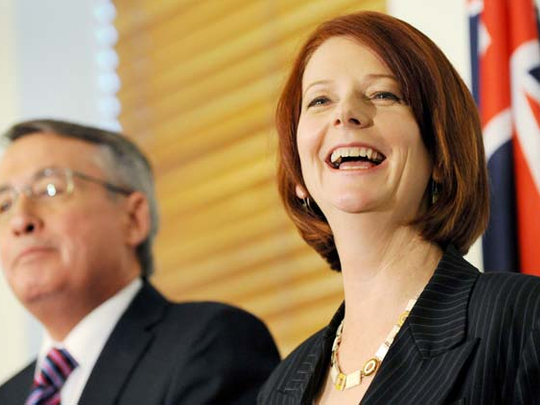
Sydney: The shadowy deposing of Australian leader Kevin Rudd by his female deputy appears to be paying off, with the first polls suggesting Julia Gillard would win the election with a commanding lead.
Gillard became Australia's first female prime minister Thursday after disposing of Rudd in a bloodless party-room coup prompted by his massive slump in public opinion polls ahead of elections expected this year.
A Nielsen poll published on Saturday showed a 14-point jump in the ruling Labor Party's primary vote to 47 per cent under Gillard, compared with 42 per cent for the conservative opposition.
With preference votes from the left-wing Greens party, the Labor party would storm to power with 55 per cent of votes to the opposition's 45 percent, Nielsen said.
Gillard's rating as preferred prime minister was a commanding 55 per cent to rival Tony Abbott's 34 per cent, a six-percentage-point bump on Rudd's final polling. Voters preferred Gillard by 44 percent to Rudd's 36 per cent.
Labor's primary and two-party preferred vote both polled higher than before the 2007 election which Rudd won by a landslide, and Labor stood to gain 11 more seats if the polls translated into votes on election day, the Sydney Morning Herald said.
A second poll, conducted by Galaxy and published by the Daily Telegraph, also showed a boost in Labor's fortunes under Gillard, with 58 per cent preferring her as prime minister to Abbott's 32 percent.
Labor's primary vote grew four percentage points to 41 percent versus the opposition's 42 per cent, but on Greens preferences the ruling party held 52 percent of the vote to the conservatives' 48 per cent.
More people thought the change of leadership was a bad decision (48 per cent) than a good one (45 per cent), but the sentiment was reversed among Labor voters, with 52 per cent approving of the move and 41 per cent against it.
Most polled (59 per cent) thought Gillard should delay the election rather than calling it as soon as possible (36 per cent) and a majority (67 per cent) said she shared responsibility with Rudd for Labor's decisions to date.
The Daily Telegraph tipped an election for either October 23 or 30, with the earliest likely dates August 21 or 28. The latest it can be held is April 16, 2011.
Polling by McCrindle Research published in The Australian newspaper also showed Labor leading the opposition, 54 per cent to 46 per cent on Greens preferences, and Gillard as preferred leader 64.8 percent to Abbott's 35.2 per cent.
Gillard said she would call an election this year, acknowledging Thursday that she had not been elected by the Australian people and wished to seek their endorsement "in the coming months."
The new leader Saturday sought a briefing from the chief of Australia's military, Air Chief Marshal Angus Houston, one day after assuring US President Barack Obama that she stood by Australia's troop commitment in Afghanistan.
Speculation mounted in the national media that Gillard would offer major mining firms a compromise on key elements of the so-called "super tax" on their profits, the damaging row over which was seen as key to Rudd's undoing.
After taking power Gillard moved swiftly to end the stalemate between the government and key mining industry, withdrawing official advertisements to promote the tax and urging the resources lobby to call off their own campaign.
BHP Billiton, Rio Tinto and the powerful Minerals Council of Australia have all complied with the request and cautiously welcomed Gillard's appointment and her promise of "throwing open the government's door to the mining industry".
Deputy Prime Minister Wayne Swan's refused Friday to declare any aspect of the tax off-limits for negotiation, a marked shift from the rhetoric of the Rudd government.












